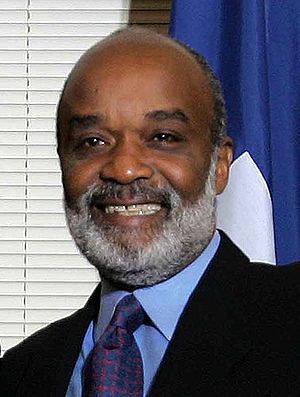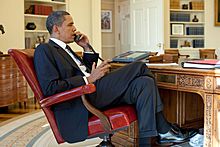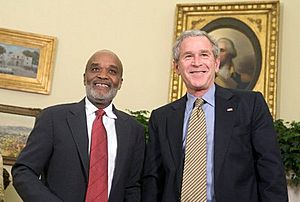René Préval facts for kids
Quick facts for kids
René Préval
|
|
|---|---|

Préval in 2006
|
|
| 41st President of Haiti | |
| In office 14 May 2006 – 14 May 2011 |
|
| Prime Minister | Jacques-Édouard Alexis Michèle Pierre-Louis Jean-Max Bellerive |
| Preceded by | Boniface Alexandre |
| Succeeded by | Michel Martelly |
| In office 7 February 1996 – 7 February 2001 |
|
| Prime Minister | Claudette Werleigh Rosny Smarth Jacques-Édouard Alexis |
| Preceded by | Jean-Bertrand Aristide |
| Succeeded by | Jean-Bertrand Aristide |
| 2nd Prime Minister of Haiti | |
| In office 13 February 1991 – 11 October 1991 |
|
| President | Jean-Bertrand Aristide |
| Preceded by | Martial Célestin |
| Succeeded by | Jean-Jacques Honorat |
| Minister of Interior and National Defence | |
| In office 19 February 1991 – 11 October 1991 |
|
| President | Jean-Bertrand Aristide |
| Preceded by | Joseph Maxi (Interior) Jean Thomas (National Defence) |
| Succeeded by | Gracia Jean |
| Personal details | |
| Born |
René Garcia Préval
17 January 1943 Port-au-Prince, Haiti |
| Died | 3 March 2017 (aged 74) Port-au-Prince, Haiti |
| Resting place | Marmelade, Haiti |
| Political party | Lespwa (2006–2009) Patriotic Unity (2009–2015) Truth (2015–2017) |
| Other political affiliations |
Fanmi Lavalas (1996–2006) |
| Spouses | Solange Lafontant (Divorced in 1997) Geri Benoit (Divorced in 2009) Elisabeth Delatour (2009–2017; his death) |
| Alma mater | College of Gembloux Catholic University of Leuven University of Pisa |
| Profession | Agronomist |
René Garcia Préval (born January 17, 1943 – died March 3, 2017) was an important Haitian politician. He was also an agronomist, which is a scientist who studies soil and crops. Préval served as President of Haiti two times: first from 1996 to 2001, and again from 2006 to 2011. He was also the Prime Minister of Haiti in 1991.
Préval made history in Haiti in several ways. He was the first elected leader to peacefully receive power from the person before him. He was also the first to finish a full term in office. Plus, he was the first to be elected president for two terms that were not back-to-back. He was also the first to peacefully hand over power to the next president.
During his time as president, Préval worked on making government companies private. He also tried to change how land was used for farming. His presidencies faced challenges like political unrest and efforts to make the economy stable. His second term was especially difficult because of the terrible 2010 Haiti earthquake.
Contents
Early Life and Career
René Préval was born in Port-au-Prince, Haiti, on January 17, 1943. He grew up in his father's hometown of Marmelade. He studied agronomy in Belgium at the College of Gembloux and the University of Leuven. He also studied geothermal sciences in Italy at the University of Pisa. In 1963, he left Haiti with his family.
His father, Claude Préval, was also an agronomist. He had been the Minister of Agriculture in a previous government. Claude Préval left Haiti because his political past made him seem like a possible opponent to the current leader. He found work with the United Nations in Africa.
After living in Brooklyn, New York for five years, where he sometimes worked as a waiter, René Préval returned to Haiti. He got a job with the National Institute for Mineral Resources. In 1988, he opened a bakery in Port-au-Prince with some friends. While running his business, he stayed involved in politics and charity work. He often gave bread to an orphanage run by Father Jean-Bertrand Aristide. They became very close friends. After Aristide became president in 1990, Préval served as his Prime Minister from February to October 1991. He then had to leave Haiti after a military takeover in September 1991.
On December 6, 2009, Préval married Elisabeth Débrosse Delatour. She was one of his economic advisors. His first two marriages had ended in divorce.
First Presidency (1996–2001)
In 1996, Préval was elected president for a five-year term. He won with 88% of the votes. When he became president in 1996, Préval was only the second democratically elected leader in Haiti's history. In 2001, he became the first elected president of Haiti to leave office because his term naturally ended.
As president, Préval made several changes to the economy. The most important was selling off some government-owned companies to private businesses. By the end of his term, fewer people were unemployed. Préval also started a program to change how land was used for farming in Haiti's countryside. However, his presidency also faced strong disagreements with the parliament. The parliament was mostly made up of members from other parties. There were also growing protests from a group called Fanmi Lavalas. This group did not agree with Préval's plans to change the economy and sell government companies. Préval strongly supported looking into and holding trials for human rights violations by military and police. In 1999, he ended the parliament and made decisions by himself for the last year of his presidency.
Second Presidency (2006–2011)
Election to Second Term
Préval ran for president again in 2006 as the candidate for the Lespwa party. This election happened after two years of international peacekeepers being in Haiti. Early results on February 9 showed he had about 60% of the votes. But as more results came in, his percentage dropped just below the 50% needed to win right away. This meant a second round of voting, called a run-off election, would be needed.
After this, many people protested in favor of Préval in Port-au-Prince and other cities. Préval said there had been fraud in the vote counting. He demanded to be declared the winner of the first round. Protesters blocked roads with burning items and even went into a fancy hotel. They wanted the election results to be announced. On February 16, 2006, Préval was declared the winner of the presidential election. He won with 51.15% of the vote after "blank" ballots were not counted.
Préval was sworn in on May 14, after Haiti's second round of legislative voting in April. He could not become president until a parliament was in place. When he was sworn in, Préval talked about how important unity was. He said that division was Haiti's "main problem" and that Haitians needed to "work together." On May 17, he chose Jacques-Édouard Alexis to be Prime Minister again. Alexis had served as Prime Minister during Préval's first term. After becoming president, Préval quickly signed an oil deal with Venezuela. He also traveled to the United States, Cuba, and France.
Préval received a lot of support from the poorest people in Haiti. He was especially popular in the poorest areas of Port-au-Prince. Many poor people wanted the former President Aristide to be allowed to return. They also wanted government workers who had been fired to get their jobs back. This caused more tension in the poor neighborhoods of Port-au-Prince. Préval promised to build a large road system. This would help trade and transportation across the country.
Working with Latin American Countries
Under President Préval, Haiti worked closely with other countries in Latin America. This helped Haiti get much-needed aid. The good relationship between Venezuelan president Hugo Chávez and Préval led to many economic agreements. Four power plants were planned to be built in Haiti. An oil refinery was also planned to produce oil. Venezuela's help to Haiti was based on a historical event. When Haiti became independent, it welcomed and helped Simón Bolívar. Haiti also provided military support to help Bolívar free Latin America.
Fidel Castro, Raúl Castro, and other Cuban officials thanked Haiti. Haiti consistently voted in the United Nations General Assembly against the United States embargo against Cuba.
Préval's good relationships with other Latin American countries created many economic chances for Haiti. Préval met with leaders like Fidel Castro, Evo Morales of Bolivia, Martín Torrijos of Panama, and Leonel Fernández of the neighboring Dominican Republic. Relations with the Dominican Republic became stronger. This was because Préval wanted to end disagreements and because both presidents focused on working together. The Dominican Republic was the first country Préval visited as president. Préval then visited the United States. There, U.S. President George W. Bush congratulated him on being re-elected. Préval said that after the Dominican Republic, the U.S. would be his first official visit. The U.S. saw Préval's meeting with Bush as a good sign of strong relations between the two countries.
April 2008 Food Riots
In early April 2008, riots broke out because food prices were very high. Since 2007, the prices for important foods, like rice, had gone up by about 50%. As the riots continued, people attacked the presidential palace on April 8. But UN soldiers pushed them back. On April 9, Préval asked for calm. He said that high food prices were a problem all over the world. He also said that destroying stores would not solve the problem. He stated that he had "ordered Haitian police and UN soldiers to put an end to the looting." People demanded that all taxes on imported food be removed. However, Préval said he could not do this because the money was greatly needed. He promised to grow more food in Haiti so the country would not rely so much on imports. But this was not enough for many protesters. On April 12, the Senate voted to remove Prime Minister Alexis from office. Préval then announced that the price of rice would be lowered. He said the rice would be made cheaper with international aid. He also said he would ask Venezuela for help to improve the economy.
The 2010 Earthquake

On January 12, 2010, Port-au-Prince was hit by a huge earthquake. At first, people could not reach President Préval. They worried he might be trapped under his collapsed home. However, later reports confirmed that the President and First Lady Elisabeth Delatour Préval were safe. They had moved to a secure place. The couple was about to enter their home when the earthquake struck. Préval and his wife were able to get away from the building before it fell, so they were not hurt.
Much of the Haitian government, including President Préval, moved to a police station near Toussaint Louverture International Airport. The number of people who died in the earthquake is estimated to be between 100,000 and 316,000. After the earthquake, President Préval was criticized by some for how he handled the disaster.
Later Life and Death
After his presidency, Préval went back to his home in Marmelade. There, he worked on projects like a farming co-operative, an education center, and a juice factory. His last public appearance was on February 7, 2017, at the inauguration of Jovenel Moïse, the new president.
President Moïse announced Préval's death on March 3, 2017, on his Twitter account. Friends of the family said that Préval had died on his way to a hospital in Port-au-Prince. At first, it was said he died from a heart attack. But because of rumors, an autopsy was done. The autopsy was not able to say for sure why he died, but it ruled out a brain hemorrhage or stroke. More tests were planned for samples from Préval's body.
Préval's body was placed at the Musée du Panthéon National Haïtien for people to pay their respects. A state funeral and a Catholic mass were held. Patricia Préval, his younger daughter, spoke about her father. Former presidents and foreign diplomats attended. His body was then taken to Marmelade, where he was buried with a three-gun salute.
See also
 In Spanish: René Préval para niños
In Spanish: René Préval para niños
 | William M. Jackson |
 | Juan E. Gilbert |
 | Neil deGrasse Tyson |


